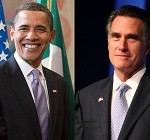Terrorism and jobs dominated the second U.S. Presidential debate on Tuesday and will likely remain front and center for the final showdown between President Obama and his Republican challenger Mitt Romney next Monday.
Jobs was not a surprise. The ability of the slowly recovering U.S. economy to get people employed is more important to voters than anything else. The surprise is that terrorism and the direction of American foreign policy has become a much larger factor. An even bigger surprise is that Romney, considered a foreign policy lightweight by the pundit class, is on the offensive.
Till just a month ago, Obama could assume a superior position to Romney as the President whose commandos killed Osama bin Laden, who finished the Iraq war and was bringing the troops home from Afghanistan in 2014 with no exceptions. Now, because of Romney’s offensive, both candidates are running neck-to-neck in the polls.
How did this come about? By happenstance the Tuesday September 11 attack on the U.S. mission in Benghazi, Libya—coming on the anniversary of America’s 9/11—has played directly into Romney’s hands. Romney has sought to put Obama on the defensive as a president who was out-of-touch and uncaring as the violence erupted.
Obama and his officials first said the attack on the U.S. consulate in Benghazi was the outgrowth of a spontaneous protest over a You Tube film that mocked the Prophet Muhammad. A day ahead of the attack, Romney had blasted the Obama Administration for allowing diplomats in Cairo apologize to mobs for the offensive film and was widely criticized for playing politics with foreign policy.
But a month after the Benghazi incident, Romney’s version of events is the accepted one. American intelligence officials testified at a Congressional hearing that they had real time satellite images of black suited militants wielding rocket-propelled grenades and attacking the consulate in a formation. The President and his Administration now agree the attack was pre-meditated and Secretary of State Hilary Clinton, trying to deflect criticism of Obama, said before the debate that it was her responsibility to protect the consulate.
But nothing is that simple in a campaign. Romney has an issue that he can use to challenge the broader sweep of Obama’s foreign policy, which he and his vice president candidate Paul Ryan call “leading from behind.” It includes Obama’s role in the ‘Arab Spring,’ his relations with Iraq and Syria, and more recently with Russia.
“This calls into question the President’s whole policy in the Middle East. The policy of leading from behind is not working,” Romney told an audience of independent voters who were selected to ask questions of the two candidates at the debate. His vice presidential running mate, Ryan, previously called Benghazi “the unraveling of” the President’s foreign policy.
“Leading from behind” is the description of a more conciliatory foreign policy that Obama instituted soon after taking office. It meant assisting and respecting the positions of other nations without a template for change and was seen as a way of ending the swaggering American rhetoric of George W. Bush. But it quickly drew critics, who said Obama was apologizing for U.S. superpower status and that it would create a more unstable world.
Israelis have been anxious about it from the start because it was a way for the U.S. to put some distance between America and Israel and try to open broader discussions with Palestine leaders. It also angered hawkish Americans who were offended by symbolic gestures, such as Obama’s deep bow when meeting Saudi Royals.
Romney, however, has a tightrope to walk in the next few weeks. Polls and the last three debates show the American people are overwhelmingly against more war or conflict intervention. Neither Romney nor Obama dare allow themselves to get trapped into a position where U.S. troops would be used to support others overseas except to protect Americans abroad, like the Benghazi consulate.
Conventional wisdom says debates don’t sway many votes, but conventional pundits never foresaw the Romney renaissance of the last month or Obama’s glaring weakness in his first debate. The debates are high-performance television, with some 70 million tuned in. Some 1 million have voted in early balloting, but it seems millions more are waiting for the outcome Monday night in Florida. That debate will be focused on foreign policy, which both candidates are likely to spin into economics, attempting to answer issues on using trade and currency changes to get more jobs in the U.S. It’s also where the Florida Jewish vote and the Middle East will be back on the table for a rematch. The world will be watching.
Bob Dowling is the Editorial Advisor at Gateway House: Indian Council on Global Relations.
This article was exclusively written for Gateway House: Indian Council on Global Relations. You can read more exclusive content here.
For interview requests with the author, or for permission to republish, please contact outreach@gatewayhouse.in.
© Copyright 2012 Gateway House: Indian Council on Global Relations. All rights reserved. Any unauthorized copying or reproduction is strictly prohibited.


